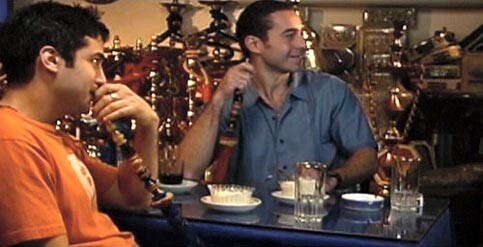The Electronic Intifada 2 June 2004

Hussam Hamedeh (l) and Waleed Zuaiter in Jihad!
Boldly using one of the most misused words in the U.S. press as its title, a word that strikes at the greatest anxiety of Americans towards Islam, the new feature film Jihad! informs its viewers that what the word is really about is zeal and struggle. Following Ed, a young Palestinian New Yorker who struggles between his homeland’s tradition and the American lifestyle, the film stresses that the most important jihad is the struggle within oneself. What can be most simply defined as Ed’s conflict between East and West, tradition and the American lifestyle, his jihad is illustrated through his tensions with his Palestinian cousin who defends suicide bombers and frowns on Ed’s “American” ways, and Ed’s struggle with dealing with choosing a wife in Palestine and carrying on his affair with Hanna, a married American woman.
Good-natured Ed seems to live in a bubble of illusion, avoiding real responsibility by working as a dog groomer in a pet store, regularly smoking pot, and pursuing the unavailable Hanna. It is his houseguest and cousin Salaam who gets Ed to question his lifestyle and thoughts towards the conflict that riddles his homeland, if only defensively at first. Filmmaker Muhammed Rum uses dreamy flashbacks to establish the events of both Ed and Salaam’s childhoods that shape their current conflicts — Ed still dreams of the beautiful Leila from Ramallah, and Salaam suffers panic attacks as a result of being traumatized by the Israeli occupation as a boy.
Regarding the technical aspects of the film, the smart transitions from flashback to present time are indicative of Rum’s cool, controlled filmmaking. The outdoor scenes shot in Ramallah and New York are bucolic, visually striking ones. For some reason, Rum becomes more creative with his camera angles in the scenes set in outdoor or large interior spaces than those in Ed’s small apartment and the cramped pet store where he works. And at times, the use of music seems heavy-handed and too dominant in some scenes, reminiscent of the way music is used to quicken the pace in television drama.
But Jihad is an ambitious film with a large supporting cast. Waleed Zuaiter stands out as Salaam, the troubled cousin from Ramallah who Rum sets his viewers up to believe is studying explosives and fuses in order to become one of the bombers that so disgust Ed (plot spoiler warning — he is really a pyrotechnician working studying independence-celebratory fireworks). And Stephanie Stone does all she can with Hanna, whose flaky, new-agey character (whom Ed’s boss Fidel comically refers to as a “tacky ho”) is never fleshed out further than a sketch.
To an extent, the same goes with the character of Ed, played by Hussam Hamadeh, who is not given much space or silence in which to develop until after his mentor Harold commits suicide upon being fired from his university job for sexual misconduct. It is somewhat bewildering how Ed, originally from Ramallah, responds with such childlike frustration each time Salaam tries to explain to him the devastation of the occupation. In the few shots of Ed in bed, after he has woken up from one of his revelatory dreams, viewers learn much more about Ed than they do from his unintelligent dialog, in which every other world seems to be “man,” “dude,” or an expletive. And because he shares so many scenes with the masterful Zuaiter, whose fish-out-of-water character gives him more room to explore, Hamadeh’s Ed seems flat next to Salaam.
Although some of the technical aspects and character development in the film leave something to be desired, the story of Jihad is creative, often comedic, and doesn’t resort to cheap sentiment. A narrative about relationships and self-conflict more than anything else, Rum employs clever plot devices to intertwine the multiple characters of the film. A jinn, or guiding sprit in Islamic mythology, manifests itself as a mysterious red-clothed man who watches over Ed in his childhood Ramallah as well as in New York, as does the image of Leila, Ed’s childhood crush and present curiosity.
A traditional Arabic song about chasing answers scattered in the wind gives theme and symbolic purpose to the multiple scenes in which Ed is chasing after something — whether it be refuge from Israeli soldiers in Ramallah or, his childhood self, like in the final flashback scene, set on September 11, in which Ed’s past and present finally come together. The theme of self-discovery or self-realization is one omnipresent in film, especially in today’s world of doubt and necessary self-reflection. But Rum smartly uses the concept of jihad to explore this in a new way, while at the same time demystifying the word so stigmatized by the September 11 terror attacks. By using the attacks as a sort of epilogue to the film, resolved are the multiple plot lines but still left open is the need for the country to contemplate and find its own answers that have scattered in the wind.
A recent graduate of the School of the Art Institute of Chicago, Maureen Clare Murphy is Arts, Music, and Culture Editor for EI.
Related links





